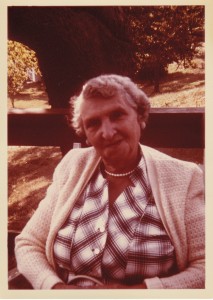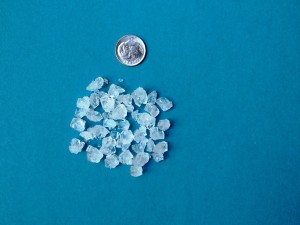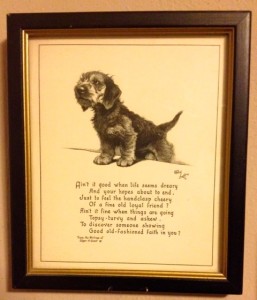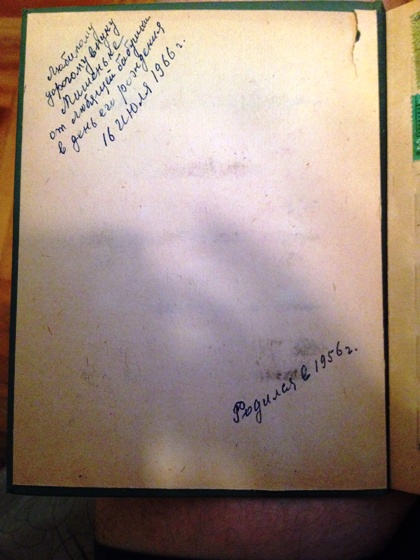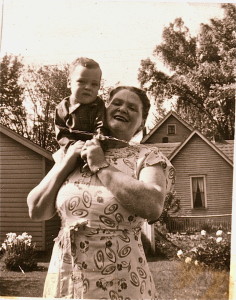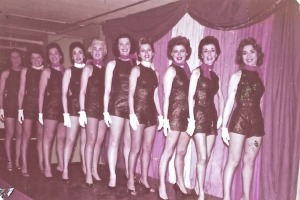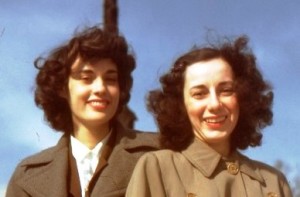Here you will find personal memories of departed family members. Scroll down to see them all. Please send yours. Photos are welcome. Submit to Mike.
Grandma Maidenberg: “It’s worth me a million dollars!” Audio clip
Rosa Maidenberg, “Grandma Maidenberg” to many of us, is featured in several of the memories below. But you can do more than read about her. Listen to Grandma speaking to Mike in 1965: “It’s worth me a million dollars!”
Grandma Maidenberg Cools the Soup
Memory by Mike Maidenberg
When I was a little boy I would often go to Grandma Maidenberg’s house after school. The school was just a block or two from where she lived. Grandma Maidenberg lived to feed us. She had a big bowl of something we called “rock candy”, basically little sugar cubes you could suck or crush. And I so clearly remember what Grandma would do when she served us hot chicken soup. She would take the steaming soup from the pot, put it in a white china cup, then pour it into another cup, back and forth, back and forth until it cooled.
This is rock candy (click on image to enlarge)
Photo Gallery of Irma’s Artwork
Flickr Gallery shared by Johna Klebenov
Grandmother Irma made the coolest art and was one of my biggest creative influences. She always had a little art studio in her house where she created her colorful, vibrant jewelry and artwork up until she passed away in 2009. When my brother David and I would go to visit, she would always set us up with creative projects – whether it was painting t-shirts, creating stuffed “3-dimensional creations” such as painted pillows or stuffed stocking dolls, or working with the moldable “friendly plastic” to make figurines that we would then paint. Many art projects occurred out on the iconic sprawling porch at 1100 Euclid Ave. All artwork seen here was lovingly created by Irma Maidenberg of Marion, Indiana.
Bubble Gum and “Ed Solomon”
Memory by Vicki Maidenberg Pemberton
Grandma always carried Bazooka Bubble Gum in her purse. It had that little comic with it. When I would visit, the first place I would go was her purse for a piece of bubble gum. One memory which continues to make me smile today was when I was sleeping over at Grandma’s house on a Sunday night. She was a huge fan of the Ed Sullivan Show but could not pronounce his last name correctly – she would say “It’s time for the Ed Solomon Show”. I recall trying to correct her and she was insistent that Ed Sullivan was Jewish (he was Roman Catholic).
Welcome to the family Mr. Solomon. 🙂
Jeely-doll was never med on GREMMuh
Memory by Jill Maidenberg
Grandma’s phone number was 2-7788. When she called our house, 4-2379, and I’d answer, she’d say, “Hello, Jeely-doll.”
Grandma always carried Bazooka Bubble Gum in her pocketbook for the grandkids.
Grandma always kept a stash of Hostess cupcakes, chocolate with a squiggly line of white frosting, 2 to a package for 13 cents. Or was it 12 cents? Grandma bought them at Shroat’s market (“Sch-RUT’s”).
When I was moody or mad, Grandma would ask me, “You med on GREMMuh?” No, I was never mad on Grandma.
What I saw at Grandma’s: FDR, her scrawled name, Grandpa’s portrait, my father in uniform
Memory by Jill Maidenberg
On Saturdays Dad and I took Grandma to the grocery. To Standard, then to Kroger’s. First we’d tour Warehouse City, driving downtown past Roskin’s and Penney’s, Jupiter and Hill’s, Osco and Pershing’s.
In Grandma’s dining room was a little telephone alcove. Grandma kept a tiny framed photograph of a man there. As a very young child I figured the man was a cousin or an uncle, but learned later that the man was FDR.
Also in the telephone alcove were snippets of paper on which Grandma had written her name, laboriously, in pencil. “Rose Maidenberg.” I don’t believe Grandma learned how to write until later in life.
In Grandma’s living room was a framed portrait of a man I always assumed was Uncle Milt. I learned later that it was Grandpa Dave.
On Grandma’s living room mantle were several framed black-and-white studio photographs, including one of my dad, Frank, in uniform.
Scary basement that smelled good, chicken soup for the dog, Yiddish
Memory by Jill Maidenberg
I never ventured into the basement at Grandma’s house. Too scary. I do remember standing in the kitchen at the basement door, inhaling the very pleasant scent of dill wafting up from where she stored jars of her extraordinary pickles.
Our fox terrier Nick would sometimes trot down D Street to Grandma’s house. She’d give him chicken soup and call us to come and get him.
Dad often spoke Yiddish with Grandma. I don’t remember him speaking Yiddish much after she died.
Grandma called her refrigerator “the Frigidaire.”
Washing Grandma’s back, the universe of her home, yellow cookies
Memory by Jill Maidenberg
Upstairs in Grandma’s house were 3 bedrooms and a bathroom with a big tub. I remember washing Grandma’s back while she soaked in the tub, her knees drawn up to her pendulous breasts. Did this really happen?
Sometimes on Fridays in third grade I’d walk from Horace Mann school, a block or so away, to Grandma’s for lunch. So much food! Then I’d hurry back to school, worrying I’d be late. School and Grandma’s house were two distinct universes.
Grandma had boarders later in life, including Lisa Abel’s 2nd grade teacher, Blanche Baker. Lisa and I assumed her name was pronounced “Blanch-ee” because of the e on the end.
Friday night dinners at Grandma’s always began with chicken soup with rice. When you got to the end of the soup you could see the floral pattern on the bottom of the bowls. Whatever happened to those dishes?
Chopped liver and chopped herring were also standards at Grandma’s. I assumed that everyone’s family served chopped liver and chopped herring.
Grandma used to bake cookies. They were yellow.
Grandma’s dress, Grandma’s garden
Memory by Jill Maidenberg
Once while perusing photos with my mom, Nanette, and Aunt Irma, I pointed at a very old photo of Grandma and noted that just the week before, Grandma wore the same dress. Mom and Irma, Rose’s modern and sophisticated daughters-in-law, laughed and laughed at that. I didn’t understand why.
Grandma kept a small garden in her backyard. I recall she grew grapes, dill, cucumbers. Vat else? Rhubarb maybe?
Grandpa’s scratchy chair, his smoking, Passover
Memory by Toby Maidenberg Klebenov
I remember a mauve colored couch in the living with a scratchy feel. The arm chair that Grandpa sat in was green, and also very scratchy. There were lace doilies on the arms of the chairs. Grandpa smoked. There was a stash of rock candy in the cupboard in the dining room, and yes, the picture of President Roosevelt.
On Passover everyone sat at a long table and when we got bored during the Seder, we would play under the table. Meyer and Dad would yell at Grandma to sit down! Stop doing this or that.
[Mike Maidenberg] Yes! I remember Passovers too. My recollection is less specific in detail, rather a memory of a boisterous, warm family celebrating together.
Grandpa coaxes me to walk with “cracker, cracker”
Memory by Toby Maidenberg Klebenov
When I was just about to walk, I remember being in the kitchen, Grandpa Maidenberg sitting on a kitchen chair, leaning over, and enticing me to walk to him, saying “cracker, cracker”. Jill does the accent. I can’t seem to do it. And I would toddle over for the Ritz cracker. I also remember helping Grandma make a challah. She gave me a small piece of dough to braid. I’m sure I made a big mess of it.
A sudden stop, a cut lip
Memory by Toby Maidenberg Klebenov
Sometimes Mother and Dad left me, (me and Michael?), to sleep at Grandma’s house. They would come by and pick us up. Grandma was just babysitting.
Then there was the time that I went with Grandpa in his car somewhere, and he stopped suddenly, and my head/lip hit the dashboard and I was bleeding. I was crying. There’s a picture of me, somewhere, holding an ice cube to my lip.
The covered mirror after Grandpa died
Memories by Toby Maidenberg Klebenov and Mike Maidenberg
(David Maidenberg died July 25, 1949. Toby was eight. Mike was six and a half.)
Toby: When Grandpa died, I remember that the mirror in the living room was covered over. Mike: Me too, but mostly I remember that when I asked Grandma why it was covered, she burst into tears. That upset me more than the thought of death.
(It is a traditional Jewish practice to cover mirrors during shivah.)
Grandma speaks Russian! A lesson in translation, and for life
Memory by Mike Maidenberg
I was having lunch at Grandma’s. The year must have been around 1960, when the story of the U-2 spy plane broke. Her black-and-white television was on, tuned to a live broadcast of Soviet leader Nikita Khrushchev. He was speaking in Russian, a simultaneous translation following with a slight lag.
Grandma suddenly convulsed in laughter. As I turned toward her, I heard the sonorous voice of the translator saying something like, “and the American leadership was caught in its duplicitous rationale…”
Grandma shook her head. Do you know what he said, she smiled. What Khrushchev actually said was that the President was like a cat that got a rat in his mouth, and could neither swallow it nor spit it out.
It was a revelation. Grandma speaks Russian! She perfectly understood Khrushchev’s crude language.
And it was a lesson for an aspiring journalist. Don’t take a translator’s, or anyone else’s words at face value. Check it out.
“Suzelah, you vant a Tvinki?”
Memory by Suzy Maidenburg Shoshan
The scent of dill is always my first thought when I think of her house and it took me a few years to figure out why my chicken soup never tasted like hers. Dill! I also recall the little cups of red Jello on the table and she always had “Tvinkis”, not Hostess Cupcakes in my time. “Suzelah, you vant a Tvinki?”
Reading about Bizzaro, practicing handwriting, kvelling in Akron
Memory by Suzy Maidenburg Shoshan
I loved going there in the summer and eating on her huge porch. I also remember that there were two or three Superman comics on one of the end tables in the living room, one being about Superman’s doppelganger (almost) Bizarro which I read repeatedly over several years for lack of any other reading material. And I would also find pieces of paper where Grandma had practiced writing her name several times. She loved the times she went shopping in Akron, because, upon mention of the name Maidenbu(e)rg, someone would invariably know of her through my Dad’s articles. Such kvelling!
Bennie’s diploma on the wall, taking her teeth out, marital advice
Memory by Suzy Maidenburg Shoshan
I stayed with her was when I was sent home from Camp Conestoga, as was David M., because we had been exposed to the mumps by Tony. I eventually got it while still in Marion and I stayed in the room where my father’s high school diploma hung on the wall: Bennie Maidenberg. However, I have to admit that when she took her teeth out at night it was a little scary for some reason. And…she always used to tell me that I should marry Reed!
Rose sees a resemblance, fractures it in the telling
Memory by Tony Roskin
My mother told me that your grandma commented on the birth of the twins (Larry and Teddy Weinberg): “They are the living hemorrhage of Jake.”
The pleasures of 1100 Euclid, not least of which is the Moldy Barferino sticker
Memory by Joe Maidenberg at age 16, adapted from his tribute in the Milt and Irma 50th Anniversary book
Grandpa and Grandma’s kitchen smells great, and that refrigerator in the back is stocked with things that give teeth nightmares and dentists a job. There are Dymo stickers everywhere, including my favorite:
A MOLDY BARFERINO LIVES HERE
A dish on the table has peppermints in it and a drawer in the bar is stuffed with gum. There’s one room that spooks me out. It has a mirrored ceiling and all manner of bizarre items. There’s a light whose leaves act as a switch, and a huge plastic turtle full of toys.
When we went to town, we would cluster around Grandpa, each putting in his two cents: I want candy! or Can we get toys? Grandma would always say “Oh Milt! Stop spoiling those children. They ought to eat real food, not candy and junk.”
He would reply, “Don’t worry, Irma, it’s only four-thirty.”
We piled into the huge green car (may it rest in peace) and headed to the store. We arrived back home toys in hand and artificial flavors in our mouths. Grandma was raving at Grandpa for buying us huge sticks of grape bubble gum, but I could tell she enjoyed seeing us happy.

The original Dymo sticker so well remembered. It lives on at Joe Maidenberg’s house in Oakland. Click on image to receive full talismanic benefit.
Pears, baseball, fun
Memory by Ted Maidenberg at age 14, adapted from his tribute in the Milt and Irma 50th Anniversary book
I remember going to Grandpa’s and Grandma’s house when I was young. We would pick pears [from an Asian apple-pear tree], play baseball and generally have fun. No matter how busy Grandpa or Grandma were they would make me feel better. If I wanted a snack they would stop what they were doing and make me one.
House, food, Barferino
Memory by Dan Maidenberg at age 11, adapted from his tribute in the Milt and Irma 50th Anniversary book
The House: Grandma and Grandpa’s house will always be a vivid memory. The plant light which I never understood (and don’t to this day!), and the “moldy barferino* will always remind me of them.
The Food: Another great aspect of their house is the constant M&M and gum source. The little hamburgers made with bread are a unique delicacy.
Grandma and Grandpa: Grandpa amused me with his sense of humor. He has a coin collection that I have always been fascinated with. Grandma, being a great chef, is also infinitely helpful.
* This artifact is also mentioned by Joe in his memory. It was an embossed tape which said, “A Moldy Barferino Lives Here.” How did it come about? Mike recalls that he, Reed and others were playing with the Dymo tape maker, and they came up with the goofiest phrase they could think of. They stuck it on the closet shelf in Reed’s room, and there it stayed until the next generation absorbed it into family lore.
A wallhanging at Grandma’s
Memory by Jill Maidenberg
My only memento from Grandma’s house is this small wallhanging from one of the bedrooms, the one overlooking the driveway, I think.
[The little poem, which you can enlarge by clicking the image, is by Edgar Guest, sometimes called the People’s Poet. He was a prolific and popular poet of the early 20th century. His best-known poem, and a Maidenberg family favorite, is “It Couldn’t Be Done.“]
The spirit of Solomon’s home in Dzygivka
Memory by Joseph Solomonovitch Maidenberg, from a 1965 letter
I keep the warmest memories of my childhood and father’s house. The income was less than modest, the house crowded, none of us children ever went to health resorts, however we grew up robust and merry fellows and jolly girls.
Solomon and Perel in Dzygivka
Memory by Amnon Maidenberg, from a 1981 letter and a 1990 letter
[1981]They earned their living by dealing in tobacco, but were held in high respect by their fellow townsmen who came to their house for advice or a friendly support. Grandfather Solomon was a connoisseur of the holy books and their comments. I remember his marvelous calligraphic handwriting both in Yiddish and in Russian. Grandmother Pearl was a warm-hearted, generous and very efficient woman.
[1990] I know from his wife Perel and my father that he was a good and unselfish man. He had a very good handwriting and knew Russian well. People of Dzygivka and neighboring villages were for the most part poor men and women; they often asked him to write for them some petitions or complaints. He always complied but never accepted any fee from their part. Everybody in the district knew that Solomon Maidenberg doesn’t help indigent people for the sake of money.
Perel in son Joseph’s vineyard, her canny storytelling about life in the Soviet Union
Memory by Amnon Maidenberg, from a 1990 letter
She liked to go with me to the vineyard where my father was working. She called it the “Garden of Eden” and often remembered her late husband Solomon who spent all his years in Dzygivka and wasn’t lucky enough to see such a beauty created by his son Josele (Joseph). Before going home she always filled two baskets of fine grapes and fruit to serve out to children of poor families in Beltsy. Pearl was a wise woman and won the respect of all. Even the elite of the town—doctors, lawyers, teachers, etc. came to our house and listened to her stories about the life in the Soviet Union which was unknown to them. From her plots, allegories, proverbs and sayings they could understand how it really was. She was a clever skillful story-teller and knew how to avoid the danger of being charged with the “grave crime” of “anti-Soviet propaganda” under the Stalin regime.
[Before the outbreak of World War II in 1941, Joseph was living in what was then Romania, in the town of Beltsy. Perel had come to live with him in 1940, after the Soviet Union invaded Romania and carved off the region in which Joseph lived. Hence the people in the region came under Soviet rule, which Perel could interpret.]
Reading the recipes for Grandma, who would add her magic
Memory by Ben Maidenburg, Jr.
When quite young, I lived with Grandma and Grandpa for a while in Marion, Indiana. The house always smelled wonderful due to the large crocks of home-made pickles which filled the basement. There always seemed to be soup cooking on the stove, and this added to the delicious aroma.
Grandma did not read English very well. I was her interpreter for recipes in English on various thing she cooked from boxes.
I remember very well that although I would read the portions, she always added to them. One spoon of sugar always became 1 ½ or 2. When I asked, she said, “It will taste better.” It did!
I remember that she cooked meat until it almost shrank. She advised, “I need to get rid of all the grease.”
Grandpa hummed more than he talked, and was a stickler about mealtimes
Memory by Ben Maidenburg, Jr.
Grandfather owned a store in Gas City called Indiana Dry Goods. He took me there several times to see it. He was always humming to himself, but was not a conversationalist, as he did not speak English very well. He was very into the proper time for meals, and I remember him looking at his watch and saying, “It’s time for lunch!”
Thawing the bedpan—Phew!
Memory by Ben Maidenburg, Jr.
When we lived in Akron, Grandma would come to visit. She regaled us and dinner guests with stories of day to day life when her children were growing up. One story in particular was that they had an outhouse, and everyone used a bedpan, which was kept on the back porch. In the morning, it had become frozen solid and they had to thaw it out. They did this by putting it on the stove to soften. I can imagine the odor!
Dr. Ganz–“Feh”. Chicken soup–Yeah.
Memory by Vicki Maidenberg Pemberton
When Lee or I were sick with a head cold, Mom would want to call Dr. Ganz. One person in our family had a much better cure than what any doctor could provide. We called it “Grandma’s Jewish Penicillin.” She called it homemade chicken soup. When Mom mentioned Dr. Ganz, she would say “Feh” showing her disapproval as she knew there was nothing better for the soul, the flu, the head cold or just plain old chills like homemade chicken soup.
“Pitter bilkes” and “Prakes” at Baba’s: family, food, Yiddish and history
Memory by Ellen Greenberg Kern, augmented
We called our grandmother, Esther Maidenberg Rosen, “Baba”. She spoke little English with a heavy Yiddish accent. I loved her soft and flabby upper arms and her crushing hugs and kisses. Our grandfather, Morris Rosen, was “Zeyda”, a quiet, gentle man who always seemed rather out of place.
I walked over to their apartment after school (Horace Mann) to watch Baba roll dough for challah or better yet, “pitter bilkes”. These rich cinnamon rolls were filled with cinnamon, raisins, butter and crushed nuts. They smelled out of this world and melted in our mouths. We weren’t taught how to bake them but then again we never asked to learn. Another Russian/Yiddish delicacy was Baba’s stuffed cabbage rolls or “prakes”. Ground beef & rice delicately rolled in cabbage leaves and slowly simmered in a slightly sweet tomato sauce. I can almost duplicate those but not the pitter bilkes. I still long for those pitter bilkes.”
Augmentation from Mike Maidenberg, who did a little Yiddish and historic research: “Pitter” is butter, “bilkes” is roll: hence “butter roll” which Esther filled with cinnamon. “Bilkes” is southeastern or Galitzianer Yiddish–and our forebears lived near Galicia. “Prakes” is also prakash. The word derives from a Turkish dish. The Turks once ruled Bessarabia, the region near where our ancestors lived. So the two dishes convey genealogical and historical data. See also a fascinating article that describes what might be called the Prakes-Golubki line, which traces the Ukraine-Poland border. The article also touches on Philadelphia, where many Jews from Ukraine migrated.
Grandmother Elkeh’s house, her cake, her gift, her nickname for me
Memory by Michael Perov
My grandmother lived in Chernigov [in today’s Ukraine], in an old wooden house with a number of neighbors and a big yard with a tree in the middle. I visited there as a little boy. It still exists. She used to cook a nice chocolate cake with walnuts for me. She would visit us in Moscow. On my 10th birthday she gave me a stamp collecting album. I started collecting then, and still do! She called me “Mishenka” or “Mishka,” which in Russian is the short name for Michael. It’s also a short name for “bear” and appears in many fairy tales.
Below is the stamp album. Elkeh’s inscription on upper left reads, “To my beloved grandson Mishenka from his loving grandmother on his birthday, July 16, 1966.” In lower right she wrote, “born in 1956.”
My Grandmother Manya: happy in frigid Kamchatka, happy cooking for 20 at the Black Sea, always happy with family
Memory by Victor Brenner
My grandparents were family-oriented, extremely social people. They cherished their family and were constantly in touch with them via mail. Grandmother Manya was deeply in love with my Grandfather Solomon for all the years they lived together. After WWII Manya left Odessa and went to live with Solomon in Kamchatka (an extremely cold and unpleasant peninsula in the far east) where Solomon was in the military service. Later Manya told me that it was the best time of her life. After they came back to Odessa they bought a small house near the Black Sea shore. Every summer they had relatives for the entire summer staying with them. Everyday Manya cooked for 18- 20 people, working hard all day. Once I asked her why she never went to the beach with me. She replied that one day she would, but now she enjoyed seeing all the family together and working hard to make them happy.
Solomon and Perel wanted their sons to become scholars, but that wasn’t for David
Memory by Amnon Josefovich Maidenberg, from a 1985 letter
Our grandparents wanted their two sons to become men of great erudition in the Bible and in the wisdom of the Talmud. But David was not very fond of staying long over the holy books. His way was a more dynamic activity. Growing up a well-built, robust and handsome youngster, at the age of 16 he left his remote native small town Dzygivka and went to seek his luck in Odessa where life was in full swing. There at first he worked as a loader at the seaport, then at a greengrocery, and at last at a bakery enterprise where his job was to deliver bread, cakes and buns to different shops and collecting the money for it. Here he got higher wages and was appreciated for his efficiency and honesty.
How David with “his kind golden heart” helped his brother and sister
Memory by Amnon Josefovich Maidenberg, from a 1985 letter
In 1902 my father [Joseph] came to Odessa to study agronomy. He lived there with his brother and earned his life by giving Hebrew lessons to children of rich families. But David, “with his kind golden heart”, as your Uncle Joseph used to say, was paying in the tuition fees for my father’s studies as well as for those of his sister Olya’s [that is, Elkeh] who also came there to attend some courses of bookkeeping. And he was doing it in spite of their protests.
David secretly fell in love with Rosa, he received his parents’ blessing, then—pogroms and emigration
Memory by Amnon Josefovich Maidenberg, from a 1985 letter
For a long time they didn’t know that David has fallen in love. He was keeping it for himself. That is why they were amazed when he told them that he has a bride Rosa by name. Next day he introduced her to them. She was a slender lovely girl and they liked her very much. Sometime later David took his bride to Dzygivka where his parents gave them their blessings. Soon after that when the Tzarist regime began inciting anti-Semitic excesses and Jewish pogroms, the young couple decided to emigrate to the U.S. and so they did. Unfortunately my father was not present at their departure because not long before that he was taken to serve in the army.
David foils knife-wielding bandits in Odessa, who later toast his courage
Memory by Amnon Josefovich Maidenberg, from a 1985 letter
David was very strong and courageous when he was young and in this connection my father told me the following story: One evening sitting side by side in the bread van the two brothers (your father and mine) were riding in the outskirts of the old Odessa and speaking peacefully. Suddenly a group of bandits appeared from a back street. Two of them stopped the horses while three others, taking out knives asked your father to give them the collected money. It seemed that there was no other way out than to obey their request. But Uncle Dave repelled the attack with such an incredible adroitness and courage that can be seen only in adventure films. Some days later he happened to meet the conquered bandits, but they didn’t try to do him any harm. On the contrary, they treated him to some glasses of beer and praised him for his courage.
David always sent money to his parents in Dzygivka, and he paid for Joseph to emigrate from Romania, but Joseph hesitated, and the brothers fell out
Memory by Amnon Josefovich Maidenberg, from a 1985 letter
Living in the U.S. your father has never forgotten his parents left in Dzygivka and until their last days helped them (by sending them money). And when your Uncle Joseph from 1917 to 1940 was living in the town of Beltsy, Bessarabia district (which was then under royal Romania’s occupation), more than once your father invited him to come to live in the U.S. In 1925, he even sent him an official call [evidently funds for travel]. But my father hesitated and at last decided to remain in his place because he felt that he couldn’t leave his beloved vineyard which he had planted with his own hands and venture to start a new life in a new world. Your father was angry with him after that.
We children celebrating Purim in Dzygivka: the sweetness of those days, now long gone
Memory by Joseph Solomonovich Maidenberg from a 1970 letter, written less than a year before his death
Not a trace is left of that distant sweet old day when two brothers and five sisters would get together in our native little home in the Ukrainian village Dzygivka on the occasion of some traditional holiday. Our favorite holiday was Purim because it was accompanied by an interesting home carnival. Purim is based on a naive but most optimistic legend-the beautiful Queen Esther, her brave brother Mordechai, and the heartless Amman. Mother would make up Olya [Elkeh] as Queen Esther, David made up himself as Mordechai, myself as Amman and our elder sister Molka as the King Akhashverosh. Father would read the legend (megillah) and the performance began. We children tried to do our best to look like the real heroes of the beautiful legend. The distribution of Purim presents followed the performance. What fun there was! Both old and young took part in the revels. There was a peculiar and inimitable atmosphere in those distant patriarchic days. But long ago the birds had flown away, and their nests fallen into pieces. Now enough of dreaming. Everything is flowing and changing—such is the law of life.
“Life is Just A Bowl of Cherries” – One of Grandmother Irma’s Favorites
Memory by Johna Klebenov
Grandmother Irma loved this version of “Life is Just a Bowl of Cherries” from the Broadway show, “Fosse” with Ben Vereen singing. I remember her sitting me down to watch this and telling me that she thought it was “just wonderful”. I am happy for this memory… and for YouTube so I can watch it whenever I need a little reminder.
The Pisher, The Nail, The Mute Cat, The Stinker: mocking Yiddish nicknames David bestowed on his sons
Memory by Frank Maidenberg, related in his oral interview
[Yiddish is known for its ability to convey insults. David Maidenberg was a master when it came to his sons.] We all had pet names. Milt had a lisp, a small speech impediment, we called him the shtimmer-kutter [literally, mute cat, or speech-impaired]. I was called the stinker because I would forget to go to the toilet sometimes. Ben was Bentsy tsvok, Benny the Nail. He was the athlete in the family. Meyer was the pisher, because he used to wet the bed.
Yiddish spoken, understood, welcomed
Memories of Suzy, David, Jill and Reed
Preface from Mike: Grandma and Grandpa Maidenberg spoke Yiddish as their first language. They also knew Russian. Their four sons absorbed Yiddish as the language used by their parents.
Even so, Grandma and Grandpa encouraged, perhaps demanded that their sons use English as much as possible. It was the prime pathway to assimilate into America. The sons in turn never passed on Yiddish fluency to their children, who were left to pick up words and phrases here and there.
But as the children grew up, from time to time a window opened into the Yiddish world in which their fathers once lived, a world they kept at arm’s length, but still found of comfort.
Suzy Shoshan:
I do remember my dad often speaking Yiddish with Grandma but don’t recall any specific moments. I can picture the two of them sitting at Grandma’s dining room table chatting and noshing.
David Maidenberg:
About my dad speaking Yiddish: it reminds me of Herman Wouk’s “Inside, Outside,” one of my favorite books. When my father spoke Yiddish, he was “inside” – in a safe place, and more willing to let his guard down.
I know he spoke Yiddish with Grandma Rose but I have no specific memory of that. What does evoke strong memories, however, is the Yiddish he spoke with Allan Zimmerman, my mom’s cousin and my dad’s close friend and long-time business partner.
What I “see” in my memory is a side of my father that I seldom saw: unrestrained joy. Knowing that us kids couldn’t understand, Dad and Allan would sometime break into Yiddish to tell what could only be the type of stories that fathers wouldn’t tell in front of young children. I see them in the living room of our home on Berkley Drive, sitting on one of the long, angular sofas that eventually were moved to the A-frame. Knowing that I am there when one of them has a joke to tell, they switch to Yiddish. When the punch line comes, they howl with laughter: knee-slapping, tear-evoking laughter.
This is my memory of my father speaking Yiddish. I didn’t mind that I couldn’t understand what they were saying. The sight of this exchange between them was far more memorable than a joke ever could have been.
Jill Maidenberg:
When I was little I’d go with Dad and Grandma to the grocery stores on Saturday. First Standard, then Kroger. Their conversations often started in English and veered to Yiddish.
Apropos Yiddish, I never heard anyone speak of this, but I got the sense that for the wives of the four brothers, Yiddish was part of the peasant culture that they were never part of…
It has always fascinated me that my parents – who grew up next door to each other, were from very different social classes. Yet both families welcomed the marriage. I can’t imagine that happening today. Perhaps despite the differences, being Jewish trumped (sorry) other factors…
It’s interesting to me the role that Yiddish played in American Jewish life at the time. For me, hearing Yiddish is a loving and emotional throwback. Probably for others too, as evidenced by the surprisingly powerful impact the Yiddish-language version of Fiddler on the Roof had on its audiences, including me. But for our parents, leaving Yiddish behind represented a foothold in this new world, which would have made their parents very happy. I guess.
Reed Maidenberg
I remember Dad speaking with Grandma Rose in Yiddish, but nothing specific. Also back and forth with Uncle Frank on occasion.
One memorable story: in 1967 after I graduated from high school and before I started at the University of Michigan Dad took me to London, Rome, and Israel…for a trip, just the two of us. We were in London in the Fortnum & Mason department store. Dad was enamored of the wild variety of stuff and arcane food items they carry. I think he wanted to buy some kind of novelty gifts or specialty chocolates as presents to bring home or to Israel.
While we were there and we were talking with a clerk Dad heard some people speaking nearby and his attention was aroused. It sounded to me like Spanish but Dad heard something else. He went over to them and he asked them in Yiddish if they speak Yiddish and they responded yes! He asked what is it that you need? And they responded they said they were looking for directions to someplace. Dad then asked the clerk for the directions and conveyed those directions to the people in Yiddish and recall that he said the word dorton, which I’d heard him say many times before. It means there.
I was impressed that he could carry on an exchange completely in Yiddish!
__________________________________________________________________________________________________________________________________________________________________
Button, button, who’s got the button?
Memory by Tony Maidenberg
Some years ago cousin Reed and I were chatting about Grandma Rose’s house. We plumbed our memories and shared the finds. We both recalled the headliners, of course: the family meals, the chicken rice soup, the old comic books, Bazooka Joe bubble gum, and the cookies. I surprised him with this one: the light switches! They really weren’t switches; they were buttons. Round and protruding from the switch plate; hit one, the button went in and the light went on. Press the other and the light went off. Funny thing, I only remember them being in the kitchen.
Oh, how we underestimated her political savvy
Memory by Tony Maidenberg
It was 1968, that dreadful year: the Vietnam War was grinding on, Martin Luther King had been murdered in April, Robert Kennedy in June. One autumn day Reed and I walked to Grandma Rose’s to see her. We talked politics on the way, for the three-person presidential race—Richard Nixon, Hubert Humphrey, and George Wallace were the contenders—dominated the news. We wondered whether Grandma had any awareness of the election and we concluded she was utterly oblivious to it all. Grandma, Reed and I ended up chatting on the front porch. During a pause in the conversation Grandma stunned us with this question: “Vell, you tink mebbee Humphrey’s gotta chance?” Reed and I looked at each other, dumbfounded, and we both laughed out loud, for Grandma had lapped us again.
Archeology at Grandma’s: box scores from the 1930’s, discovered as liners of drawers
Memory by Tony Maidenberg
Baseball was the polar star of my life from the time I was nine years old. The Dodgers were the Brooklyn Dodgers, and guys like Jackie Robinson and Duke Snider were my heroes. I loved the game and its history. Long before I learned that the Marion Public Library had microfilm of old newspapers, I discovered something wonderful in the bedrooms of Grandma Rose’s house. She lined the drawers of the bedroom chests with newspapers and the papers were never changed. One night when I stayed over I made my first old newspaper discovery—and found, much to my astonishment, box scores of baseball games from the 1930’s in the yellowing newspaper pages lining the drawers. I pored over those old box scores as if they were scraps from the Dead Sea Scrolls. From that moment on I always explored chests and closets at Grandma’s house looking for baseball history on old newspapers.
Herring + crackers + comic books = Heaven
Memory by Tony Maidenberg
We all have our food memories from 814 Third Street, Grandma Rose’s house. We all lovingly remember—no, not just remember, we can still smell and taste—the chicken rice soup served in those wide bowls on the back porch. And she made cookies, tasty in their own right though I preferred Grandma Helen’s sugar cookies next door. But it was the herring, the marinated herring Grandma made from scratch, that captured my taste buds. I don’t just remember the herring, I celebrate it, for my mouth waters as I type. It was best on the old-fashioned Saltine crackers. And Grandma’s renter for some years, Dorothy Walters, a Marion Community Schools employee, loved it as well. Give me a jar of herring, a package of Saltines, and maybe three comic books, and I was in heaven.
The Cookie Monster would have loved Third Street
Memory by Tony Maidenberg
Third Street wasn’t just marked by Grandma Rose’s house at 814. Immediately next door to the east was the home of Grandma Helen, my mother’s mother, Helen Zimmerman. (Yes, Dad married the girl next door.) Two grandmothers, side by side. Yellow cookies, browned a bit at the edges, that was Grandma Rose. Crisp sugar cookies, so much sugar that the cookies sparkled, those were the product of Grandma Helen’s finest kitchen work. Sweet memories, indeed.
Baba’s tickling game
Memory by Ellen Greenberg Kern; photo above shows Esther with grandson Jeff
Baba (Grandmother Esther) played a game with us as little children. She grabbed/gathered the bit of flesh atop our little hands and sang, “Tsip, saw pemmela…” and then tickled us. [The Yiddish seems to be, “Pinch like this, slowly.”] I also remember Mother telling me Baba wanted to name me Pearl, after her mother. Think my dad vetoed that one. I’m named after his mother, Eta. I’ve since chosen my own Hebrew name, “Ilana”.
Those great Sinai Temple shows of the 1950’s
Memory by Ellen Greenberg Kern
I remember those Temple musicals put on by the talented Sisterhood. I think Nan, Irma and others wrote the plays and maybe changed the lyrics. Sylvia often “starred” belting out those tunes. Song titles like “Take Back Your Mink”, “You’ve Not heard of Dr. Gonzales”, “Life Upon the Wicked Stage”. Mom and I would practice singing the lyrics while doing the dishes.
[You can see photos and programs by scrolling down here.]
Four Big Maidenberg men being little boys
Memory by Tony Roskin
At Shambarger’s restaurant in Redkey, Indiana, where you had to wait for your table…Milt, Ben, Frank, Meyer and a few other mature gentlemen outside laying pennies on the railroad track and whooping it up as the locomotive rolled by.
The power of Jeanne Maidenburg’s beauty
Memory by Jill Maidenberg
I cherish that beautiful photo of Jeanne and Nanette, close friends and sisters-in-law. It reminds me that when I was little I was so awed by Jeanne’s beauty that I was often unable to speak in her presence. I thought she was a movie star and couldn’t believe we had a celebrity in our house.
